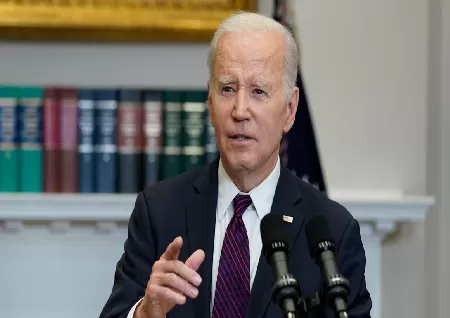Former Biden adviser Tribe : Just use the 14th Amendment now

The long-time constitutional scholar said Biden's concern that it would be exposed in court was unfounded.
President Joe Biden made headlines Tuesday when he said he was thinking about using the 14th Amendment to settle the debt stalemate, but he was afraid it would wind up in court.
On Wednesday, the politically engaged constitutional scholar who introduced Biden to the concept dismissed the president's worries.
"I don't think there's any litigation to fear," Harvard professor Laurence Tribe said, adding that he "hopes" Biden recognises a legal challenge isn't a big deal.
Tribe's statement to Biden is his latest attempt to encourage the president to use fresh legal arguments to resolve the increasingly complicated debt ceiling dispute. Tribe's quest for the 14th Amendment initially caught Biden's attention in a May 7 New York Times op-ed in which he stated that the debt ceiling must be ignored in order for the president to carry out other laws passed by Congress.
At a news conference on Tuesday, Biden acknowledged receptivity to the argument but essentially dismissed the idea of pursuing it in the context of the present deadlock. Because the application of the 14th Amendment would be contested in court, he added, it would raise similar concerns about default and, perhaps, market turmoil. He said that he would consider the suggestion if the present conflict was resolved.
"When we get through this, I'm thinking about taking a look at [it]," Biden added.
In an interview, Tribe stated that House Republicans, who have signalled that they may challenge the president's use of the 14th Amendment, cannot sue the president for failing to violate the Constitution. He predicted that such a case would be rejected by the Supreme Court.
"Even bending their standing doctrine, I don't know how they or anyone could find somebody with standing to sue the president and the secretary of the Treasury for spending money that Congress has said they're supposed to spend," Tribe added. "What would a court tell them not to spend their money on?"
On Tuesday, Biden referred to Tribe as "a man I have enormous respect for" and someone who counselled him "for a long time." Tribe declined to disclose if he had discussed the 14th Amendment with the White House.
Tribe's position is that Congress cannot pass legislation compelling the administration to spend money and incur debt while also imposing a separate financial cap on that expenditure.
The concept of leveraging the 14th Amendment, which states that the nation's obligations "shall not be questioned," to continue paying payments on spending approved by Congress has gained traction as the country approaches default. That might deepen if and when the present impasse ends, as White House officials have stated that Biden is serious about looking into it as a way to avoid another round of the nation's budgetary drain in the future.
"The debt limit has no effect on debt. It serves no constructive purpose. "It's just a formula for periodic crises," Tribe explained.
Democrats on Capitol Hill like the notion, but they are wary of supporting the escape route due to similar concerns about a potential judicial challenge.
"I personally believe we should test it," said Democratic whip Sen. Dick Durbin (D-Ill.). However, "we can't afford to go into a last-minute court battle with the June 1 deadline."
Rep. Jamie Raskin (D-MD), an emeritus constitutional law professor at American University, stated that if the stalemate continues, "there is a pretty clear constitutional command" to pay obligations. He also admitted that "virtually no precedent" exists under the 14th Amendment. However, the president may be "forced to choose between violating the Constitution and violating the laws of the country, which require him to pay the bondholders and Social Security recipients."
Republicans, on the other hand, who want to utilise the debt limit to slash spending, are hostile to the proposal.
"Unconstitutionally acting without the consent of Congress is also not an option," Senate Minority Leader Mitch McConnell warned.
Tribe said he's not sure how the White House could legally proclaim it was using the 14th Amendment to ensure the country paid its payment, but it wouldn't be a difficult task.
"Is it an executive order or a directive in the form of a presidential statement?" That hasn't worked, and I'm convinced Stu Delery, the President's White House counsel, will be working on it if Congress stays obstinate and refuses to yield," he added.
Related queries to this article
- 14th Amendment
- debt stalemate
- President Joe Biden
- Laurence Tribe
- constitutional scholar
- legal challenge
- debt ceiling dispute
- Congress
- White House
- Supreme Court
- spending money
- obligations
- debt limit
- Capitol Hill
- constitutional command
Read more articles and stories on InstaSity Trending Topics.





